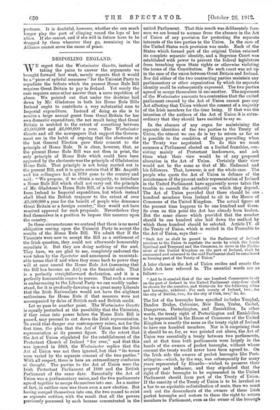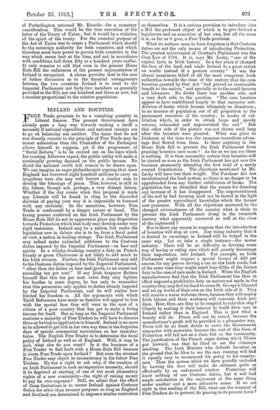DESPOILING ENGLAND W E regret that the Westminster Gazette, instead of
taking the pains to answer the arguments we brought forward last week, merely repeats that it would be a" piece of spiteful meanness " for the Unionist Party to repudiate the tribute which the present Home Rule Bill requires Great Britain to pay to Ireland. Yet surely the case requires some other answer than a mere repetition of abuse. We pointed out that under the doctrine laid down by Mr. Gladstone in both his Home Rule Bills Ireland ought to contribute a very substantial sum to Imperial expenditure. Instead of doing so she is to receive a large annual grant from Great Britain for her own domestic expenditure, the net result being that Great Britain is mulcted to the extent of something between £5,000,000 and £6,000,000 a year. The Westminster Gazette and all the newspapers that support the Govern- ment are in the habit of arguing that the electorate at the last General Election gave their consent to the principle of Home Rule. It is clear, however, that, as the present Home Rule Bill was not then in print, the only principle of Home Rule which could have been approved by the electorate was the principle of Gladstonian Home Rule. That principle is not being carried out in the present Bill, and it is quite certain that if Mr. Asquith and his colleagues had in 1910 gone to the country and said : " We propose, if we obtain a majority, to introduce a Home Rule Bill which shall not carry out the principle of Mr. Gladstone's Home Rule Bill, of a fair contribution from Ireland to Imperial expenditure, but which instead shall bleed the British taxpayer to the extent of over £5,000,000 a year for the benefit of people who denounce Great Britain as a foreign country," they would not have received approval for such proposals. Nevertheless they find themselves in a position to impose this measure upon the country.
In these circumstances we contend that there is no moral obligation resting upon the Unionist Party to accept the results of the Home Rule Bill. We admit that if the Unionists were now to accept the Bill as a settlement of the Irish question, they. could not afterwards honourably repudiate it. But they are doing nothing of the sort. They have, we are glad to see, completely endorsed the view taken by the Spectator and announced in unmistak- able terms that if and when they come back to power they will at once amend the Home Rule Act (assuming that the Bill has become an Act) on the financial side. That is a perfectly straightforward declaration, and it is a perfectly honourable course to pursue. That such a course is embarrassing to the Liberal Party we can readily under- stand, for it is gradually dawning on a great many Liberals that the Irish Nationalists would not have the slightest enthusiasm for Home Rule if that measure were not accompanied by doles of British cash and British credit. Let us pass to another point. The Westminster Gazette is equally perturbed at the possibility that the Unionists, if they come into power before the Home Rule Bill is passed, may proceed to cut down the Irish representation. To avoid that danger our contemporary raises, not for the first time, the plea that the Act of Union fixes the Irish representation at its present figure. To the retort that the Act of Union stipulated for the establishment of the Protestant Church of Ireland " for ever," and that this was ignored in 1869, the Westminster replies that the Act of Union was not then ignored, but that " its terms were varied by the separate consent of the two parties." With all respect, there is here an extraordinary confusion of thought. The parties to the Act of Union were the Irish Protestant Parliament of 1800 and the British Parliament of the same date. Essentially the Act of Union was a parliamentary union, and the two parliaments agreed together to merge themselves into one. As a matter of fact, in neither case was there even a new election. But having merged themselves into one, the two ceased to exist as separate entities, with the result that all the powers previously possessed by each became concentrated in the united Parliament. That this result was deliberately fore- seen we are bound to assume from the absence in the Act of Union of any provision for protecting the separate interests of the two parties to the Union. In the case of the United States such provision was made. Each of the States which formed part of the original Union retained its complete separate identity, and a Supreme Court was established with power to prevent the federal legislature from trenching upon State rights or otherwise violating the terms of the Constitution. No such court was set up in the case of the union between Great Britain and Ireland. Nor did either of the two contracting parties maintain any parliamentary or other organization by which its separate identity could be subsequently expressed. The two parties agreed to merge themselves in one another. The argument of the Westminster amounts to a contention that the united parliament created by the Act of Union cannot pass any Act affecting that Union without the consent of a majority of the Irish members for the time being. If that was the intention of the authors of the Act of Union it is extra- ordinary that they should have omitted to say so.
In the absence of any organ for maintaining the separate identities of the two parties to the Treaty of Union, the utmost we can do is try to return as far as is possible to the condition of things prevailing when the Treaty was negotiated. To do this we must summon a Parliament elected on a limited franchise, con- sisting mainly of Protestant landowners, and ask them what their view would be of any proposed alteration in the Act of Union. Certainly their view would not be the same as that of Mr. Redmond and his followers. That, however, is not the whole case. The people who quote the Act of Union in defence of the maintenance of the present unfair representation of Ireland in the United Parliament lave apparently never taken the trouble to consult the authority on which they depend. The Act of Union provided that there should be one . hundred members from Ireland to sit in the House of Commons of the United Kingdom. The actual figure at the present time happens to be one hundred and three. So even on this point the Act has already been broken. But the same clause which provided that the number should be one hundred also laid down the method by which these hundred should be selected. Article IV. of the Treaty of Union, which is recited in the Preamble to the Act of Union, says that- " Such Act as shall be passed in the Parliament of Ireland previous to the Union to regulate the mode by which the Lords Spiritual and Temporal and the Commons, to serve in the Parlia- ment of the United Kingdom on the part of Ireland, shall be summoned and returned to the said Parliament shall be considered as forming part of the Treaty of Union."
A later clause in the Act of Union recites and enacts the Irish Act here referred to. The essential words are as follows :— " And be it enacted that of the one hundred Commoners to sit on the part of Ireland in the United Parliament sixty-four shall be chosen for the counties, and thirty-six for the following cities and boroughs, videlicet: For each county of Ireland, two ; for the city of Dublin, two; for the city of Cork, two," &c. &c.
The list of the boroughs here specified includes Youghal, Bandon Bridge, Coleraine, New Ross, Tralee, Cashel, Dungarvan, Portarlington, and Enniskillen. In other words, the treaty right of Portarlington and Enniskillen. to be represented in the House of Commons of the United Kingdom is exactly the same as the treaty right of Ireland to have one hundred members. Nor is it surprising that it should be so, for, as was pointed out above, the Act of Union was essentially a treaty between two parliaments, and at that time both parliaments were largely in the hands of the owners of pocket boroughs, without whose consent the treaty would never have been agreed to. On the Irish side the owners of pocket boroughs like Port- arlington—which, by the way, was subsequently for many years represented by Ricardo—wished to preserve their property and influence, and they stipulated that the right of their boroughs to be represented in the United Parliament should form part of the Treaty of 'Union. If the sanctity of the Treaty of Union is to be invoked as a bar to an equitable redistribution of seats, then we must seek out the descendants of the owners of these Irish pocket boroughs and restore to them the right to return members to Parliament, even as the owner of the borough of Portarlington returned Mr. Ricardo—for a monetary consideration. This would be the true execution of the letter of the Treaty of Union ; but it would be a violation of the spirit of the treaty. For the essential purpose of the Act of Union was to create a Parliament which should be the sovereign authority for both countries, and which therefore must have power to govern both countries in the way which seems best at the time, and not in accordance with conditions laid down fifty or a hundred years earlier. It only remains to add that even in the present Home Rule Bill the unfairness of the present representation of Ireland is recognized. A clause provides that in the case of future discussion as to the financial arrangements between the two countries Ireland is to send to the Imperial Parliament not forty-two members as generally provided in the Bill, nor one hundred and three as now, but a number proportional to the relative population.



















































 Previous page
Previous page